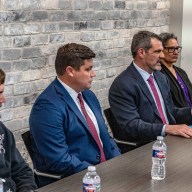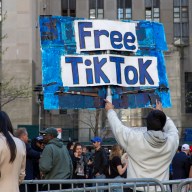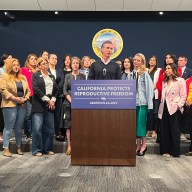TEHRAN, Iran – In a massive outpouring reminiscent of the Islamic Revolution three decades ago, hundreds of thousands of Iranians streamed through the capital Monday, and the fist-waving protesters denounced President Mahmoud Ahmadinejad’s claim to victory in a disputed election.
Standing on rooftops, pro-government gunmen opened fire on a group of protesters who had tried to storm the militia’s compound. One man was killed and several others were wounded in the worst violence since the disputed election Friday.
Angry men showed their bloody palms after cradling the dead and wounded who had been part of a crowd that stretched more than five miles (nearly 10 kilometres) supporting reform leader Mir Hossein Mousavi.
The huge rally reinforced what has become increasingly clearer since the election: the opposition forces rallying behind Mousavi show no signs of backing down. Their resolve appears to have pushed Iran’s Islamic establishment into attempts to cool the tensions after days of unrest.
Police and other security forces stood by quietly – some sitting on stoops with their batons and shields resting behind them as the marchers swallowed the streets in parts of Tehran. Estimates put the turnout at hundreds of thousands overflowing the square, where crowds of 200,000 have filled the plaza in the past.
Mousavi made his first public appearance since the polls closed, and he launched his claims that the vote was rigged to re-elect the hard-line president.
Brief clips of the march were shown on state television in an extremely rare nod to anti-government attacks.
“Respect the people’s vote!” Mousavi cried through a hand-held loudspeaker in Azadi, or Freedom, Square – where Iran’s leaders hold military and political gatherings.
It appeared that Iran’s ruling clerics had opened the door for the demonstration – even giving it news coverage – in a possible bid to avoid more street clashes and seek some breathing room in the growing confrontation.
But a single moment could change all that. Gunfire erupted from a compound used by the Basij, a volunteer militia linked to Iran’s powerful Revolutionary Guard. An Associated Press photographer saw at least one demonstrator killed and several others with what appeared to be serious injuries. The protesters had tried to storm and set fire to the compound on the edge of Azadi Square.
Some reports put the death toll higher, but they could not be confirmed.
The dead man, wearing a white shirt and khaki pants, lay sprawled on the sidewalk with blood from a head wound spilling onto the pavement. Nearby, protesters carried another gunshot victim, a makeshift tourniquet around his thigh, onto the back of a yellow taxi.
It was first known death in Tehran since postelection clashes erupted and could be a further rallying point in a culture that venerates martyrs and often marks their death with memorials. One of Mousavi’s Web sites said a student protester was killed early Monday in clashes with plainclothes hard-liners in Shiraz in southern Iran. But there was no independent confirmation of the report.
The United States was “deeply troubled” by reports of violence and arrests in Iran, State Department spokesman Ian Kelly said, but he added that the U.S. knows too little about the conduct of the election to say for sure whether there was fraud.
Britain and Germany joined the calls of alarm over the rising confrontations in Iran. In Paris, the Foreign Ministry summoned the Iranian ambassador to discuss the allegations of vote-tampering and the violence.
Protests also spread across the country. Witnesses told the AP that pro-Mousavi demonstrators clashed with police in the historic city of Esfahan and the northeastern city of Mashhad, a conservative bastion with one of Iran’s most holy Shiite shrines.
Police in Shiraz fired in the air to disperse several pro-Mousavi gatherings. Fars Province Police Gen. Ali Moayeri said officers had been “authorized to shoot. From now on we will respond harshly.”
In the heavily Arab city of Ahvaz near the Iraqi border, a crowd of about 2,000 people chanted: “We don’t want a dictator!” Police attacked some with batons.
Mousavi said another rally was planned for Tuesday in north Tehran, the hub of his youth-driven campaign and now a nerve centre for his opposition movement.
This is the type spreading unrest most feared by Iran’s non-elected ruling clerics, who control all important decisions but are rarely drawn directly into political disputes. A long and bitter movement against Ahmadinejad could push the dissent past the presidency and target the theocracy itself.
It also has the potential to embolden some members of the ruling inner circle, such as the powerful former President Hashemi Rafsanjani, who strongly opposed Ahmadinejad during the campaign.
“That sets you up for a tremendous split,” said Jon Alterman, head of the Middle East program at the Center for Strategic and International Studies in Washington. “It could be tremendously destabilizing because if the office of (Supreme Leader Ayatollah Ali Khamenei) is damaged, then the whole shape of leadership … moves into flux.”
There’s widespread belief that Khamenei – the successor of the Islamic Revolution patriarch Ayatollah Ruhollah Khomeini – will do what it takes to keep the system intact.
He welcomed Ahmadinejad’s victory on Saturday. By Monday, however, he directed one of Iran’s most influential bodies, the Guardian Council, to examine claims of election fraud. The move had no guarantee it would satisfy those challenging Ahmadinejad’s re-election or quell their anger after the weekend unrest.
The 12-member Guardian Council, made up of clerics and experts in Islamic law and closely allied to Khamenei, must certify ballot results and has the apparent authority to nullify an election. It would be an unprecedented step. Claims of voting irregularities went to the council after Ahmadinejad’s upset victory in 2005, but there was no official word on the outcome of the inquiry, and the vote stood.
More likely, the intervention by Khamenei sought to lower the tensions and give some time for possible further talks with Mousavi, who was prime minister in the 1980s.
At the rally, Mousavi had strong words for those standing in his way for his demands to cancel elections, including the ruling clerics.
“I am ready to pay any price to carry the ideals of you, dear people,” said Mousavi, who wore a grey striped shirt.
“We must regain our trampled rights and stop this lie and stand up to fraud and this astonishing charade,” he said, looking out over the huge crowd and raising his arms in salute. “Otherwise, nothing will remain of people’s trust in the government and the ruling system.”
He also said he has little hope that the Guardian Council will annul the vote. The crowd roared back: “Long live Mousavi.”
“This is not election. This is selection,” read one English-language placard at the demonstration. Other marchers held signs proclaiming “We want our vote back!” and made a V-for-victory salute.
Although any rallies were outlawed earlier, security forces were not ordered to move against the protesters, many waving the green banners and ribbons – the symbolic colour of Mousavi’s movement.
Authorities have blocked pro-Mousavi Web sites and text messaging, but word of the rally was passed by emails, phone calls and word of mouth.
At nightfall, Ahmadinejad opponents again shouted their denunciations from Tehran’s rooftops. Cries of “Death to the dictator!” and “Allahu akbar!” – “God is great!” – echoed across the capital for a second night.
It’s a deeply symbolic tactic that Mousavi borrowed from the Islamic Revolution and the idea that people power can challenge any system. The rooftop cries were how Khomeini asked Iran to show its unity against the Western-backed shah 30 years earlier.
Tehran police and hard-line militia stormed the campus at the city’s biggest university early Monday, ransacking dormitories and arresting dozens of students angry over what they say was mass election fraud.
Protesters also gathered outside Iranian diplomatic offices in London, Ankara and other cities. In Dubai, home to about 200,000 Iranians, 150 demonstrators stood outside the consulate in the withering Gulf summer heat and chanted: “Where is my vote?”
–
Murphy reported from Cairo, Johnson from Tehran. Associated Press writer Sebastian Abbot in Cairo contributed to this report.
















